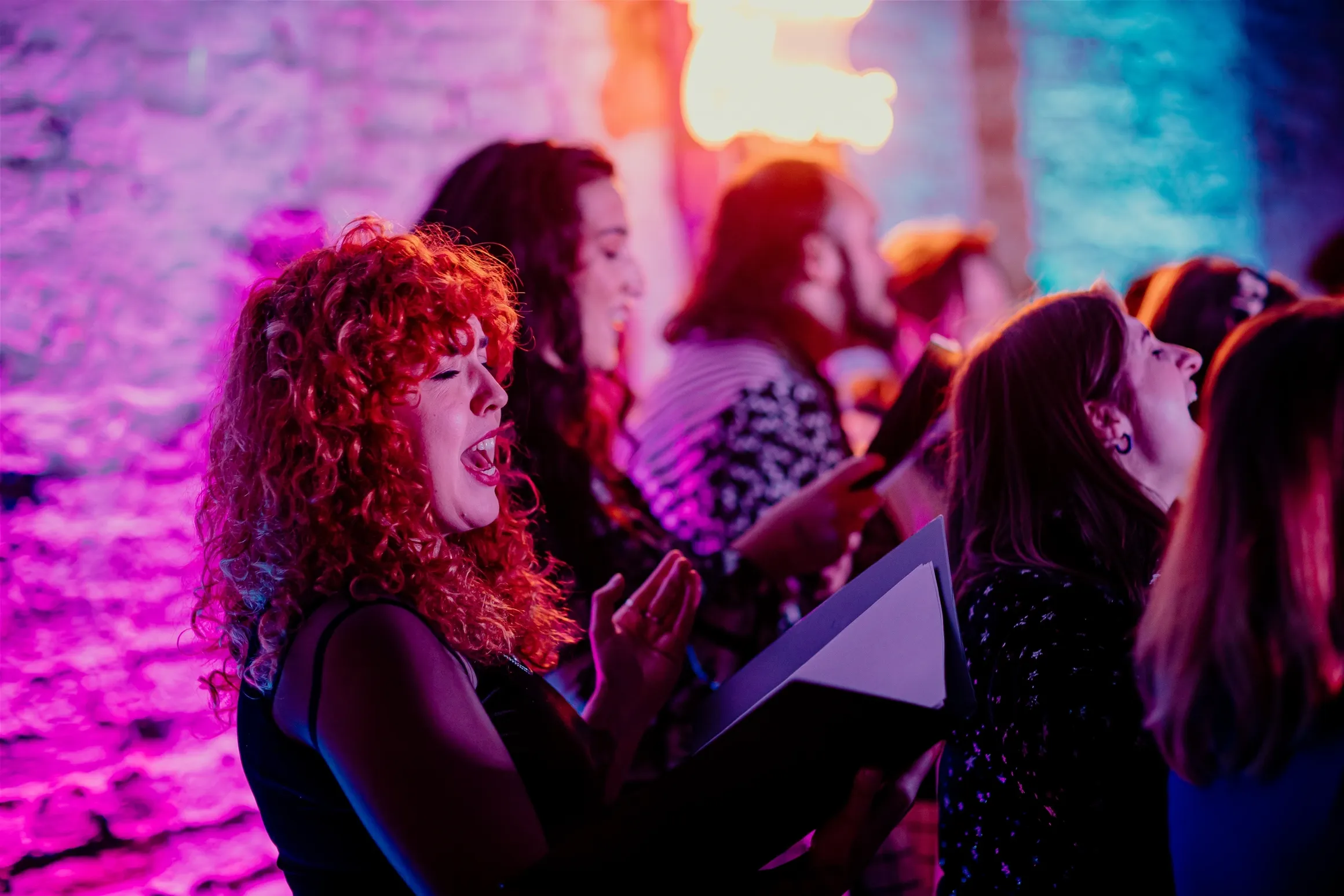The therapeutic power of song in my women’s choir provides me with an outlet to express my emotions and find community, breaking through societal expectations of silence and restraint.
“I feel like I want to scream”, I told my therapist. I’d imagine it’s a common phrase. Talking to female friends about any emotional strain, life stress or mental upset, it’s usually the outcome, feeling all those frustrations and problems build up with no natural outlet and no socially acceptable way to wail it out. “Have you thought about joining a choir?” my therapist replied.
The Groove Chorus is a central London amateur group of women of all ages, one of the many new choirs popping up around the city, among 40,000 similar groups in the whole country (as of 2017). At 6 pm on Thursday nights, I go along tired at the tail end of the week and always leave energised. Unrestrained volume is still something I’m getting used to, even in my seventh week. Singing mostly empowering songs by women, like Madonna, Self Esteem and Lizzo, it’s an hour to turn my head off and switch my lungs on, somehow allowing me to get things out without the need to say anything.
The act of being loud seems to be enough. “There is heaps of research proving how singing in choirs can boost your mental health. It has the same effect on your mind as exercise,” Silv Pybus, the choir founder, adds. “The thing with music and singing is that whatever emotion you have inside of you, it has the power to give you the release that you need!”
Over recent years, we’ve seen a trend towards private, quiet processing. Article after article, social post after post, proclaims that we should all see a therapist and work through our issues calmly with a professional. Over the last five years, search volumes for therapists have doubled as record numbers of people seek therapy, with the NHS reporting a 21% rise in referrals. As reported in 2014, with the numbers likely higher now, one in every eight people in the UK is in therapy or receiving mental health treatment. So we’re working through our issues, but what if that isn’t enough?

Lucy has joined The Groove Chorus in London
For women especially, the push to quiet personal processing feels like a further push towards a calm life. Most women will likely relate to having their voices quietened over time; you can scream until a certain age when it becomes unladylike. Your tantrums become unbecoming, and you’re quickly punished for vocalising your anger, upset, or excitement. “I definitely think women are discouraged or made fun of for showing loud enthusiasm,” Annie said, another member of the choir I joined at my therapist’s recommendation.
Another member, Karen, mentions fandoms as a perfect example of girls being shrugged off or silenced for their excitement; “Men get a lingua franca to talk to other men with sport. I envy that. Women don’t have that and their collective interests are usually under-appreciated or even sneered at.”
Regularly confronted with men yelling sports chants on the street, all-out screaming in stadiums or dominating pubs every whatever-cup season; you never hear anyone tell them to quieten down. Male-oriented collective experiences, like sport, welcome loud outpourings of feeling. Yet, while women are stereotypically painted as emotional people, with even the word ‘screaming’ itself feeling feminine, I’m struggling to think of an example of a collective experience women get that allows them to be loud and passionate.
Singing Through The Rage: 10 songs for choral catharsis
- ‘good 4 u’ – Olivia Rodrigo
- ‘Prioritise Pleasure’ – Self Esteem
- ‘Happier Than Ever’ – Billie Eilish
- ‘Flowers’ – Miley Cyrus
- ‘Give Me The Night’ – George Benson
- ‘Special’ – Lizzo
- ‘Hold The Girl’ – Rina Sawayama
- ‘Anything But Me – MUNA
- ‘Lean On Me’ – Bill Withers
- ‘Beautiful’ – Carole King
I asked my friends, choir mates and housemates. Very few women in my life can remember the last time they screamed. The only image I can think of to portray collective female rage is the fictionalised scene in Midsommar.
It’s a tried and tested system. In religion, hymns and choirs have long been a part of the programme as a form of worship to lift voices and spirits. Suzy Duxbury, who sings with IDMC, a London gospel choir, sees its effect on herself and the women around her; “It’s a therapeutic atmosphere. We support each other and lift each other up. We turn up subdued but by the end, the endorphins have us dancing, giggling, and lifted in spirits.”
With secular society lacking the community that religion brings, especially for women, music can be a solution (online searches for “women’s choir” have met the number for “men’s choir” for the first time in five years).
“Other than a concert, I can’t think where they could scream and be loud without being judged”, Annie adds to the topic, with music coming up repeatedly as a vehicle for emotional release. As more artists seem to add a scream section into their set, with Phoebe Bridgers getting her female-dominated crowd full body scream during ‘I Know The End’ or Wet Leg inviting you to do your “longest and loudest scream,”; it seems we all need it. And just as crowds mask any individual embarrassment about the emotional release, the choir provides a similar platform, letting women raise their voices with no stigma or shushing.
Printing out the sheet music for ‘Good 4 U’ by Olivia Rodrigo, I’m excited about the next rehearsal. Like my weekly rage room, my scream harmonising with all the others without ever having to think about what I want to say or regulate how loud I want to say it, I know by 8:30 I’ll feel better.




